- 24/7 Free Consultation: (888) 424-5757 Tap Here To Call Us
Chicago Group Home Neglect Lawyer

Compensation for Victims of Neglect in Group Homes
Across Illinois, thousands of vulnerable residents rely on group homes, also known as Community Integrated Living Arrangements (CILAs), to provide the safe, supportive environments they need. Yet abuse and neglect remain an ongoing issue, often requiring the services of a group home neglect lawyer.
According to the Illinois Department of Public Health, in 2023, the department issued a total of 1,313 state licensure violations across various residential facilities, especially those housing adults with developmental disabilities. When group homes fail to deliver necessary services, the consequences can be severe, both physically and emotionally.
Understanding your legal options is the first step toward protecting your loved one and holding negligent facilities accountable.
Understanding Group Homes in Illinois and Their Purpose
A Community Integrated Living Arrangement (CILA) provides housing and daily support tailored to how individuals with developmental disabilities live, especially those with cognitive or neurological conditions. CILA providers operate under the supervision of the Illinois Department of Human Services (IDHS) and must comply with strict regulatory standards.
These homes differ in structure based on the level of support each resident needs. Some offer 24-hour supervision similar to foster care, while others function as supported or assisted residential settings for those who require less daily assistance. Regardless of the setup, all group homes must protect residents’ dignity, health, and safety and provide access to qualified healthcare professionals.
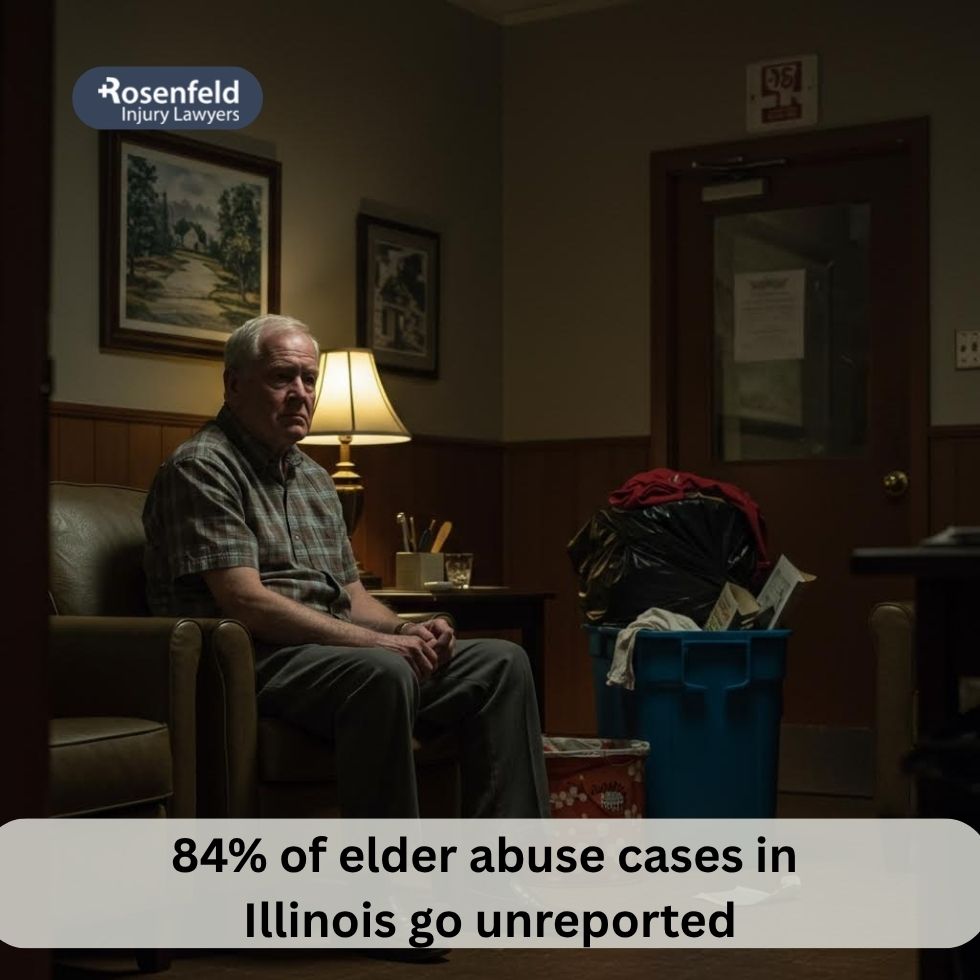
Examples of Group Home Facilities in Chicago
Chicago is home to several CILA providers that offer housing and support services for individuals with developmental disabilities. These organizations operate under the oversight of the State’s Department of Human Services and are committed to promoting independence and inclusion for their residents.
Here are some examples of group facilities in Chicago:
- Envision Unlimited offers residential care and life skills support for adults with intellectual and developmental disabilities in community-based settings.
- Misericordia Home provides a continuum of residential options and therapeutic programs for individuals with mild to severe developmental disabilities.
- UCP Seguin of Greater Chicago delivers residential support, educational services, and day programming for adults with a wide range of disabilities.
- Clearbrook operates multiple homes and service programs in the Chicago area designed to support children and adults with intellectual and developmental disabilities.
These facilities play a crucial role in supporting individuals who need access to the resources and care they need to lead fulfilling lives.
The Duty of Care Owed to Residents in Group Homes
Under 210 ILCS 135, Illinois law requires group home operators to provide safe housing and adequate supervision. This responsibility includes not only physical protection but also emotional and psychological health.
When a staff member fails to respond to a medical emergency or ignores a resident’s care plan, the facility could be held responsible for any resulting harm.
Group home operators are expected to hire qualified staff, provide them with adequate training, and monitor care delivery to residents requiring special care. A breach of this duty puts residents at risk for serious injuries and ongoing trauma.
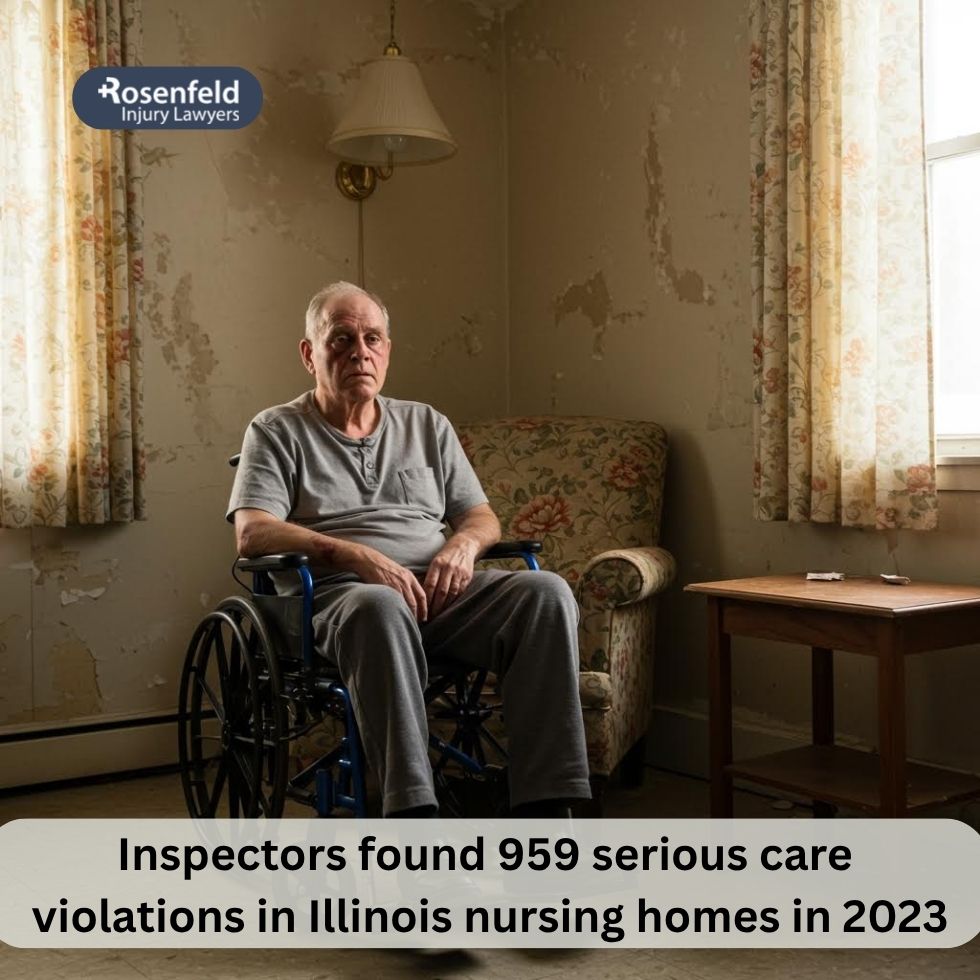
Types of Abuse or Neglect Seen in Chicago Group Homes
Unfortunately, many forms of mistreatment occur behind closed doors in residential care settings. Group home residents often depend on staff for daily care, safety, and dignity, making them especially vulnerable when caregivers fail to meet basic standards.
Physical Abuse
Physical mistreatment remains a major concern. In this context, it includes actions like hitting, slapping, shoving, and improper use of physical restraints. Some residents suffer injuries from rough handling during transfers or assistance with mobility.
Others may experience unexplained bruises or fractures that signal repeated harm. Any use of force that causes pain or bodily harm constitutes physical abuse and must be taken seriously. A Chicago nursing home physical abuse attorney can help you take legal action.
Emotional and Psychological Abuse
Emotional abuse in group homes often involves verbal threats, humiliation, or constant belittling of residents. Staff may isolate residents as punishment or ignore their needs, especially those who have limited communication abilities.
Repeated psychological mistreatment can cause anxiety, depression, and severe behavioral changes. Isolation from peers, family, or activities can worsen their mental health and create long-lasting damage.
Sexual Abuse
Sexual abuse, including sexual assault and exploitation, is a devastating reality in many residential care settings. Adults who live in group homes may struggle to communicate what has happened or may not fully understand the abuse they experienced.
Sexual abuse can come from staff or other residents and often goes unreported due to fear or shame. Facilities must actively monitor for any signs of inappropriate contact, provide training on boundaries, and thoroughly vet staff before hiring. Should they fail to do so, a Chicago nursing home sexual abuse attorney can help you take legal action.
Common Forms of Neglect
Neglect occurs when staff fail to provide essential health support, resulting in harm. This includes missing doses of medication, ignoring medical care needs, or delaying treatment for infections or chronic conditions. Residents may go without assistance bathing or toileting, leading to infections and poor hygiene.
Insufficient access to food and water can cause dehydration or rapid weight loss. Without supervision, residents can wander into dangerous situations or suffer injuries without anyone noticing. These are clear violations of basic care standards.
Red Flags to Look For
When visiting a loved one, watch for warning signs of abuse or neglect. Sudden changes in behavior like withdrawal, fear, or agitation can signal psychological mistreatment or trauma. Physical symptoms such as unexplained bruises, weight loss, or dehydration may indicate neglect or physical abuse.
If staff block private conversations with your loved one, or if living conditions appear unsanitary, you may need to report concerns and seek legal guidance immediately.
Underlying Causes: Why Abuse and Neglect Occur
Several factors contribute to poor care in group homes. Staffing shortages are one of the most common issues. Facilities often rely on underpaid, overworked employees, which increases the risk of mistakes and mistreatment.
Inadequate training leaves staff unprepared to handle residents with complex needs. Additionally, negligent hiring practices can result in individuals with criminal backgrounds or no experience caring for vulnerable populations working unsupervised.
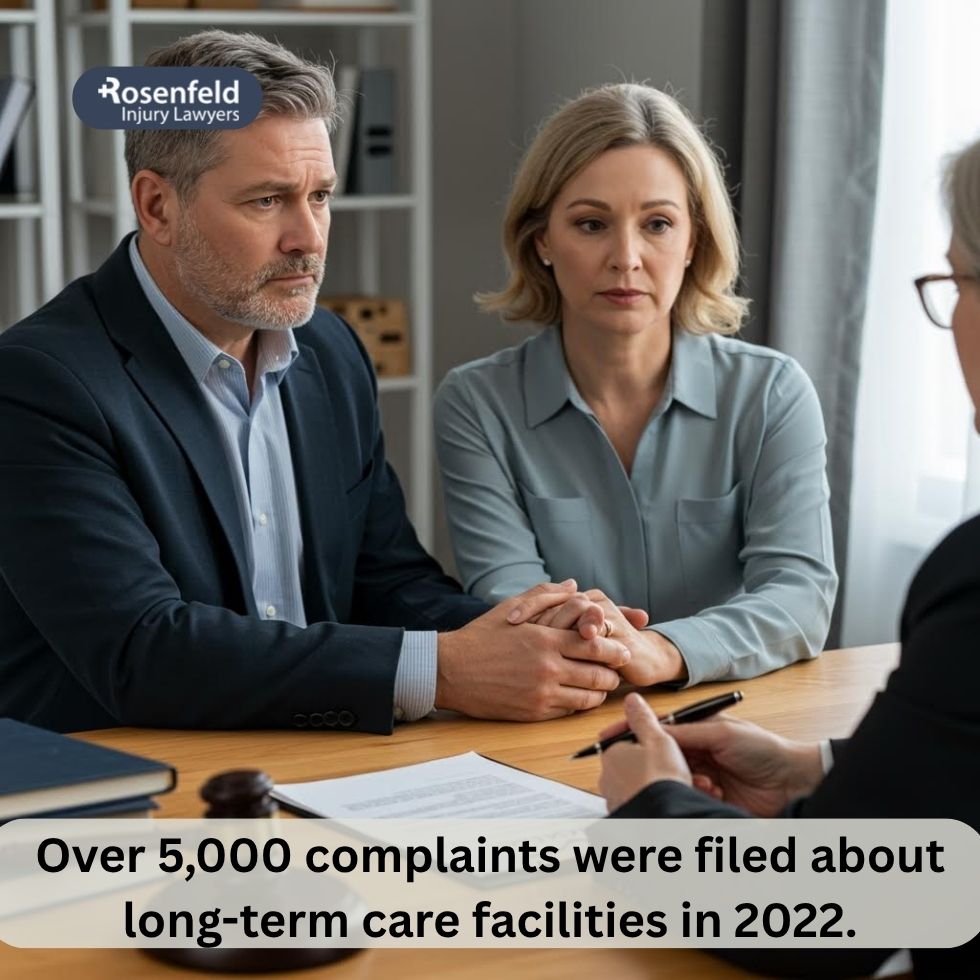
Who Can Be Held Liable When Harm Occurs?
When harm occurs in a group home setting, the organization responsible for managing the residence may be legally accountable. Liability often stems from systemic failures, such as improper staffing, failure to screen employees, or overlooking known risks within the home.
Beyond the facility itself, individuals providing care can also face legal scrutiny. Workers who engage in misconduct or fail to respond to clear signs of distress may be liable for their actions. In rare cases, others involved in the resident’s day-to-day life, like housemates or third-party contractors, can also contribute to unsafe conditions.
When multiple breakdowns in care occur, determining who is responsible requires a thorough investigation and experienced legal guidance.
Legal Rights of Residents and Family Members Under Illinois Law
Illinois law offers important protections for residents living in CILAs. The Community-Integrated Living Arrangements Licensure and Certification Act requires all group homes to meet specific standards for staffing, safety, supervision, and medical care. When a facility fails in its duty, relatives can take legal action.
Additional statutes and local regulations further safeguard vulnerable individuals in group homes:
- The Illinois Nursing Home Care Act—While often associated with traditional nursing homes, 210 ILCS 45 can also apply in some group care settings. It protects residents’ rights to dignity, proper treatment, and freedom from physical and emotional abuse and neglect.
- The Adult Protective Services Act—320 ILCS 20/15 provides a framework for reporting and investigating abuse and neglect of adults with disabilities. It mandates that certain professionals and organizations submit incident reports to the Illinois Department of Human Services.
- The Illinois Mental Health and Developmental Disabilities Code—This law governs the rights of individuals receiving services due to intellectual disabilities or other qualifying conditions. It reinforces the need for appropriate psychological abuse protections and safeguards surrounding restraints, medication, and freedom from unlawful isolation.
Together, these legal protections establish the right to proper care, safety, and a supportive environment. If a resident sustains severe injuries, is subjected to sexual abuse, or experiences a decline in health due to poor conditions, legal help is available.
Filing a personal injury or wrongful death claim against a nursing or group home can help families hold the facility accountable and push for meaningful change in how vulnerable residents are treated.
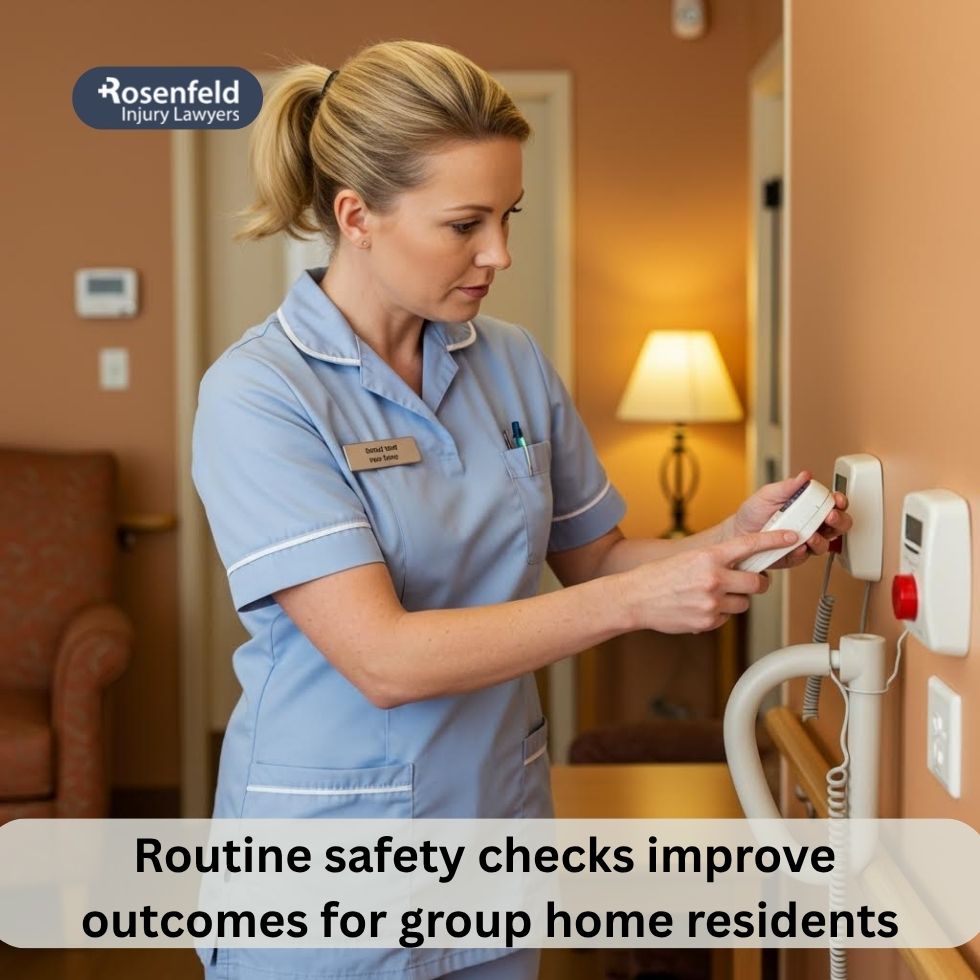
Steps to Take if You Suspect Group Home Abuse or Neglect
If you suspect abuse or neglect in a group home, acting quickly can make a critical difference in your loved one’s safety and well-being. Residents with intellectual disabilities may have difficulty communicating harm, which means loved ones must be especially alert and proactive.
Start by taking the following steps:
- Ensure the resident’s immediate safety, especially if you believe they are in ongoing danger.
- Document concerns thoroughly, including visible injuries, behavioral changes, and anything your loved one says or does that raises concern.
- Report incidents to the group home management and ask for a written response or confirmation.
- Contact the Illinois Department of Human Services (IDHS) hotline, and, depending on the situation, consider reporting to Adult Protective Services or the regional Ombudsman.
- Seek a full medical evaluation by independent healthcare professionals to assess any physical or psychological harm.
- Consult a group home neglect lawyer to review your case and determine whether filing a claim is appropriate.
Taking these steps protects your loved one and creates a paper trail that may support a future case. Early intervention is essential when addressing harmful treatment in Illinois group home facilities.
Filing a Lawsuit: The Legal Process in Chicago
If a group home’s negligence caused harm to your loved one, you have the right to pursue a civil lawsuit. This process allows families to seek compensation for damages related to medical treatment, emotional trauma, and other losses tied to mistreatment.
In Chicago, the legal process typically includes:
- Initial Case Review – An attorney evaluates the facts of your case, including medical records, facility documentation, and witness accounts.
- Filing the Complaint – A formal lawsuit is filed against the group home, staff member(s), or any other liable party.
- Discovery Phase – Both sides exchange evidence such as internal reports, medical care logs, staff training records, and communication records.
- Depositions and Witness Interviews – Attorneys may question facility staff, medical professionals, and family under oath.
- Settlement Talks or Mediation – Many group home neglect cases are resolved before trial through negotiation or mediation.
- Trial (if needed) – If no settlement is reached, the case proceeds to trial, where a judge or jury determines liability and damages.
Filing a lawsuit gives families the chance to pursue justice and recover costs associated with hospital visits, ongoing care, and the emotional toll that cruelty or neglect may cause. A successful case can also create pressure for better oversight and safer conditions for other patients.
Overcoming Challenges in Group Home Abuse Cases
Pursuing a lawsuit involves collecting clear evidence that the group home failed to provide adequate care. This can include facility records, medical records, staff schedules, internal reports, and statements from relatives or other residents.
Unfortunately, these cases often come with challenges:
- Residents may struggle to communicate due to disabilities.
- Facilities might delay or hide internal reports.
- Staff members could be uncooperative or unavailable.
- Incomplete or missing medical records and documentation.
- Witnesses may fear retaliation or be hard to locate.
An experienced attorney understands how to navigate these obstacles. They know what records to request, how to interview witnesses, and how to expose gaps in the facility’s documentation. Skilled legal help can make the difference between a dismissed claim and meaningful compensation.
If your family is seeking accountability, working with the right legal team gives you the tools to move forward.
The Importance of Medical Records and Expert Witnesses
Medical records are essential in these cases. They can show untreated conditions, injuries that match patterns of physical abuse, or signs of long-term neglect. Photos of injuries, statements from other residents or visiting loved ones, and internal facility reports all help establish what occurred.
Expert testimony may also support claims of neglect or improper care. Every piece of documentation plays a role in proving the truth. Records from medical professionals, staff schedules, and reports submitted to the state’s Department of Human Services can further validate claims.
These materials often highlight missed care, inconsistent supervision, or gaps in treatment that suggest deeper systemic issues.
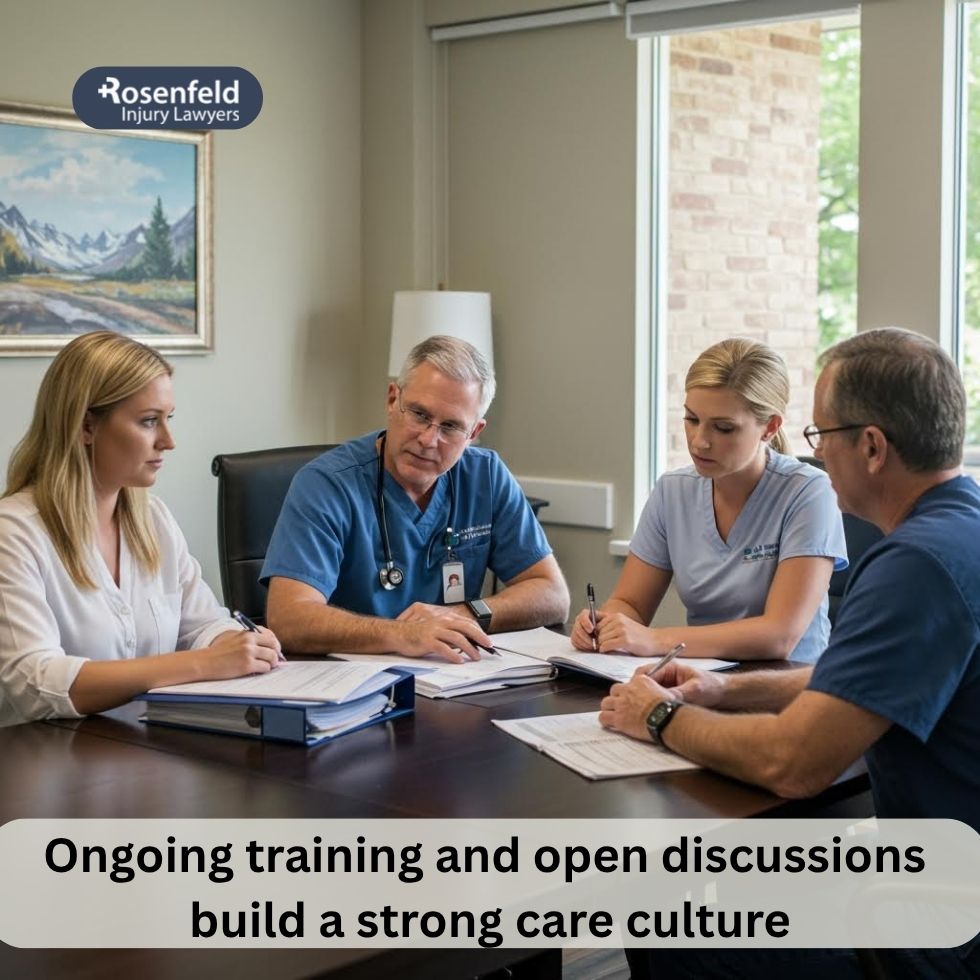
Compensation Available for Victims and Families
Victims of group home mistreatment may be entitled to damages for pain and suffering, medical expenses, emotional distress, and the cost of relocating to a safer facility. If the abuse resulted in a death, wrongful death damages may apply.
Compensation can also cover therapy and long-term medical care. A group home neglect lawyer can help calculate total losses and pursue appropriate restitution.
Why You Need an Experienced Chicago Group Home Abuse Lawyer
These cases require a specific skill set. A lawyer familiar with community integrated living arrangement regulations, care standards, and personal injury litigation can handle the complexities of your case.
A knowledgeable legal advocate helps navigate the system, pursue legal avenues, and push for accountability when a loved one has suffered serious injuries in a residential setting.
Our Firm’s Commitment to Holding Negligent Facilities Accountable
Our team is dedicated to protecting vulnerable residents in the Chicago area. We investigate claims of sexual assault, physical and emotional abuse, and neglect. Every resident deserves appropriate treatment, and we pursue legal action to uphold their rights.
With years of experience holding CILA providers responsible, our law firm remains committed to improving conditions for those with developmental disabilities who live in group homes.
FAQs About Chicago Group Home Abuse & Neglect
What Is the Main Difference Between a Group Home (CILA) and a Traditional Nursing Home in Illinois?
Group homes serve individuals with developmental or mental disabilities and focus on helping them live in community-based settings. Nursing homes generally provide skilled nursing care to elderly adults or those with serious medical conditions.
What Specific Types of Evidence Are Most Impactful in Proving Group Home Neglect?
Facility and healthcare records and eyewitness statements are crucial. Photos of mysterious bruises or injuries, expert evaluations, and documented complaints all support a strong legal claim.
Can We Pursue a Claim if Another Resident Caused the Harm in the Group Home?
Yes. If a facility fails to supervise residents properly or allows known risks to go unchecked, it may still be liable even when the harm comes from other residents.
How Long Do Family Members Have to File a Lawsuit Related to Group Home Abuse in Illinois?
The statute of limitations can vary, but per 735 ILCS 5/13-202, most cases must be filed within two years of the incident. To preserve your legal rights, speak to an experienced attorney as soon as possible.
Consult a Chicago Group Home Neglect Attorney Near You!

If someone you love has experienced abuse or neglect in a group home, legal help is available. Contact our firm for a free case evaluation. Our CILA home abuse lawyers serve Cook County and the greater Chicago area, advocating for families affected by group home mistreatment.
Contact us at (888) 424-5757 or through our online form to book a free consultation with a nursing home abuse lawyer in Chicago.
All content undergoes thorough legal review by experienced attorneys, including Jonathan Rosenfeld. With 25 years of experience in personal injury law and over 100 years of combined legal expertise within our team, we ensure that every article is legally accurate, compliant, and reflects current legal standards.







